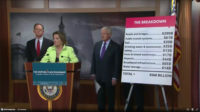As Congress and construction industry groups continue to wait for President Trump to release long-promised details of his infrastructure investment plan, a bipartisan group of U.S. House members is proposing an array of possible ways to increase infrastructure funding and make improvements in how projects are financed and implemented.
The proposals, in a new report from the 48-member “Problem Solvers Caucus,” include a wide range of familiar points, including “sustainable and long-term funding” for the Highway Trust Fund, incentives for states to use public-private partnerships to deliver projects and additional “streamlining” in the project-permitting process.
The report, released on Jan. 10, doesn’t recommend particular funding levels for the types of infrastructure it discusses—including highways and bridges, ports and waterways, drinking water and wastewater treatment, energy and communication.
Nor does it list specific preferred policy solutions for the problems it identifies. Rep. Elizabeth Esty (D-Conn.), a co-chair of the caucus’s infrastructure working group, said at a press conference, “This is a menu of options, of tools that are available, and we welcome other ones, too.” [View video of press conference here.]
For example, in addressing one central issue—the Highway Trust Fund’s chronic revenue shortfall—the report lists a variety of possible actions, such as “modernizing” the fuels tax, indexing it for inflation, charging a registration fee for electric or hybrid vehicles or imposing a tax on waybills for freight carried by trucks.
But Rep. John Katko (R-N.Y), the working group’s other co-chair, underscored that the group isn’t recommending a gas-tax hike.
Katko also said, “Many of these ideas have been around for a while but what’s really unique about it…is the fact it’s a bipartisan effort.”
Brian Turmail, Associated General Contractors of America spokesman, agreed. He said via email, “The most significant part about this plan is that it is bipartisan, which serves as a clear indicator that infrastructure is one area where Republicans and Democrats can agree.”
Turmail also said, “It will provoke a needed, and timely, conversation about the best way to address infrastructure funding needs.”
Katko said the group wanted to release its report before President Trump unveils details of his long-awaited $1-trillion, 10-year infrastructure plan.
Katko added,”We want to be able to say, ‘You’ve got some votes already [for the plan]. Let’s get this thing going.’”
Pro-infrastructure groups like Building America’s Future and the Bipartisan Policy Center also welcomed the caucus’s action, noting that its report includes steps that their organizations had previously recommended.
Former Pennsylvania Gov. Ed Rendell, who is Building America’s Future’s co-chair, said, “We are confident the recommendations put forward today will help bring long-term and sustainable improvements to our roads, bridges, ports and railways.”
The Transportation Construction Coalition, which includes the American Road & Transportation Builders Association, AGC and other groups, said in a statement,”The caucus puts its finger on the most important transportation infrastructure issue: the need for a permanent solution to the Highway Trust Fund’s revenue shortfall….”
The transportation coalition noted that, since 2008, the trust fund has been kept in the black through $140 billion in transfers from the general fund and other actions. It added that the most recent $70 billion of those transfers will run out in fiscal year 2020, and unless a fix is made, highway program funding will have to be cut about $19 billion a year.
Story corrected 1/11/18 with correct name of Bipartisan Policy Center



